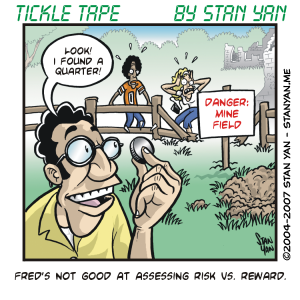Our common-sense approach to decision making often works quite well, but there are times when we arrive at decisions that are just plain wrong. This has led some psychologists, such as Amos Tversky and Daniel Kahneman, to suggest that everyday thinking departs from “rationality.” That is, compared to an ideal rational decision-making machine that only uses hard data, humans extend their knowledge beyond the limits. They don’t have the hard facts or actual data in front of them at all times, so under these circumstances, they rely on “heuristics” or “rules of thumb” to make decisions.
Let’s look at some classic examples to understand how these everyday rules of thumb or heuristics work. Consider two questions that most people do not have real data as a basis for making judgments:
1. Which is more likely in the English language?
(A) Words beginning with the letter K (such as kind)
(B) Words with K as the third letter (such as make)
2. Upon visiting the Middle East, which situation are you more likely to encounter?
(A) Terrorist attack
(B) Traffic accident
When research participants are asked these two questions, they are more likely to choose selection (A) as the correct answer. Why? Tversky and Kahneman note that we do not have the actual data in front of us to make these decisions. Instead, we must rely on our memories. When it comes to words in the English language, we do not know offhand how many words begin with K versus how many have K as the third letter.
Thus, we try to think of examples. It’s easy to think of words that begin with K, but it is much harder to think of words where K is the third letter. Most people believe that more words begin with K than have K in the third position based solely on the ability to recall instances. But this is not correct. Many more words have K in the third position. It’s just hard to recall them. (It’s even hard with a dictionary in front of you)
People answer the second question using a similar approach. We can vividly recall instances of terrorist attacks in the Middle East (especially these days), and so we believe there are more terrorist attacks than traffic accidents in the Middle East. But the hard data show that there are more traffic accidents. Again, our memory fools us. We rely on our memory to provide data, rather than knowing that we should not trust our memory and seek out the actual hard data for our judgments.
Tversky and Kahneman call this phenomenon the availability heuristic. Certain memories of events are more easily recalled and are thus more “available” for use in making decisions. In many everyday situations, using the available information is all we can do. It works as a decision-making strategy much of the time, but we have to remember that there are some situations where we don’t have all the necessary hard data to make a decision. It’s at these times that we need to tediously find the actual data and use it to make our decisions.
Behavioural economists have been very persuaded by the work of Tversky and Kahneman. Economists have had difficulty making accurate forecasts of the market, and behavioural economists are interested in finding examples of “irrational decisions” to explain why market prices are difficult to predict. It’s useful to consider this perspective. Perhaps some of the decisions you make are “irrational” and should be avoided. Look out for them!


